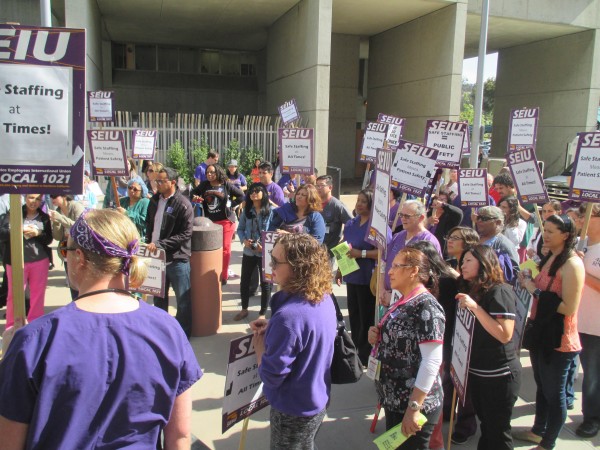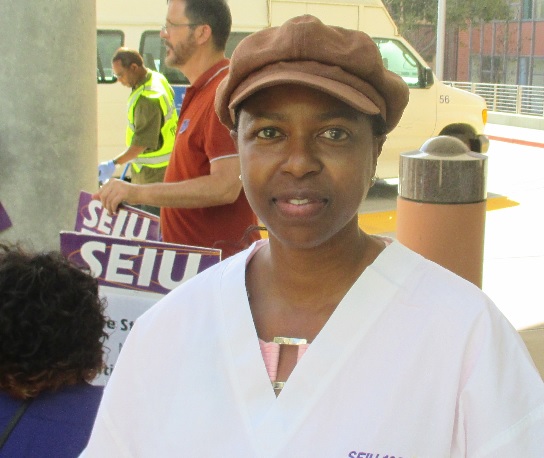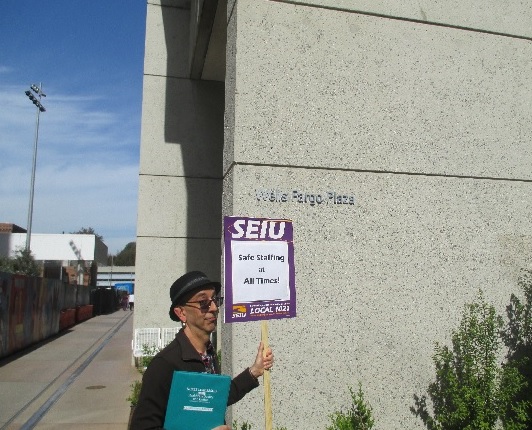I just spent an hour with the nurses and their allies at a rally in front of Zuckerberg General Hospital, near Wells Fargo Plaza. The nurses, members of SEIU Local 1021, are protesting staffing levels, saying the brand new facility hasn’t hired enough trained clinical workers to provide adequate patient care.

“Although San Francisco is on the verge of opening a new hospital building, there’s an ongoing and unaddressed need to assign appropriate levels of caregivers to patients,” the union says. “Nurses can often go an entire shift without access to the rest and meal breaks that are required by California’s signature safe RN staffing law.”
It’s kind of crazy –we are putting all this money into a shiny new facility, and we can’t hire enough staff to make it safe for workers and patients?
Some of the nurses are also upset that a hospital that was largely paid for with taxpayer money, through a very large bond act, is now named after the founder of Facebook and part of the grounds bears the name of Wells Fargo Bank.
Sasha Cuttler, an RN and union member who wrote about this for 48hills, told me that he doesn’t like the idea of selling the name of a public hospital – but he has a larger concern. See, Facebook has been doing research on users, in fact, Facebook data was used for a major study on “emotional contagion” – that is, whether “emotional states can be transferred to others …. leading people to experience the same emotions without their awareness.”
In the study, the researchers (with the cooperation, of course, of Facebook) messed with the news feeds of 689,000 Facebook users to see if it could manipulate their emotions. At the time, the prestigious journal said the whole thing was perfectly fine, since when people sign up for Facebook, the terms of use (which nobody ever reads) allows this type of research to be conducted without informing the users or seeking their consent.
But in academia, this sort of thing is frowned on, deeply. And in fact, the PNAS has since posted a “Statement of Concern,” noting that
Obtaining informed consent and allowing participants to opt out are best practices in most instances under the US Department of Health and Human Services Policy for the Protection of Human Research Subjects (the “Common Rule”). Adherence to the Common Rule is PNAS policy, but as a private company Facebook was under no obligation to conform to the provisions of the Common Rule when it collected the data used by the authors, and the Common Rule does not preclude their use of the data. Based on the information provided by the authors, PNAS editors deemed it appropriate to publish the paper. It is nevertheless a matter of concern that the collection of the data by Facebook may have involved practices that were not fully consistent with the principles of obtaining informed consent and allowing participants to opt out.
And now Facebook is continuing to use its systems, including new emojis, to track the emotions of users. Which is a little creepy.
“Does naming a research hospital for Mark Zuckerberg seem like a reward for engaging in unethical research?” Cuttler asked.
Then I met Yolanda Herron, who works in the Records Dept. at General (which is what I will continue to call the hospital that my tax dollars paid for), and she told me that she’s horrified that every day she has to walk by Wells Fargo Plaza to go to work.

Wells Fargo took her house in Oakley during the foreclosure crisis, she said. “The sent me to eight different agents,” she said. Over a period of six months, they kept changing the rules, asking for different documents, then foreclosed anyway. It’s a common story.
“It really hurts,” the 26-year city employee said. “It’s like I can’t get rid of Wells Fargo.”
Yes: Zuckerberg and Wells gave money to the hospital. If this nation had even remotely reasonable tax policies, none of that would be necessary – Zuckerberg and Wells Fargo would pay enough taxes to fund public needs, like SF General. Instead, we beg them for money and reward them for doing what they should have done anyway.
And we make some of the workers at their hospital sick just thinking about it.







